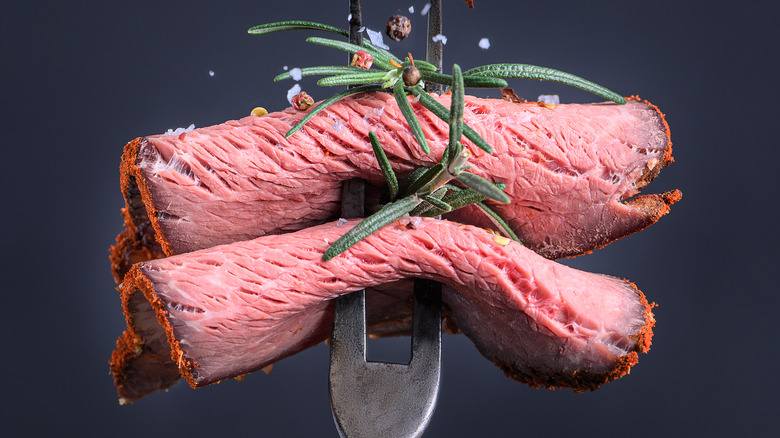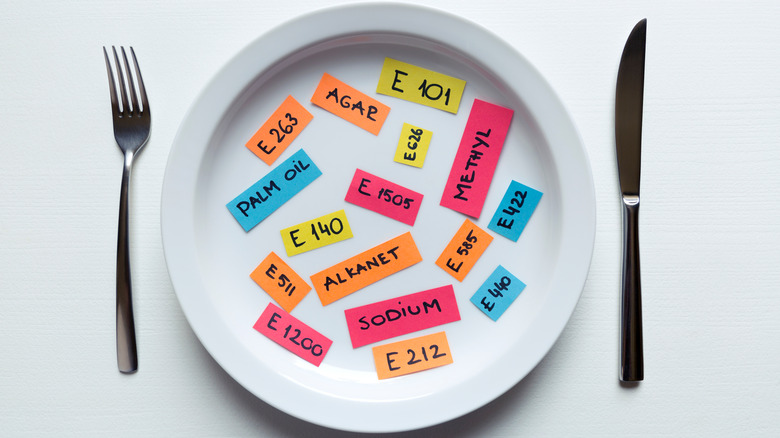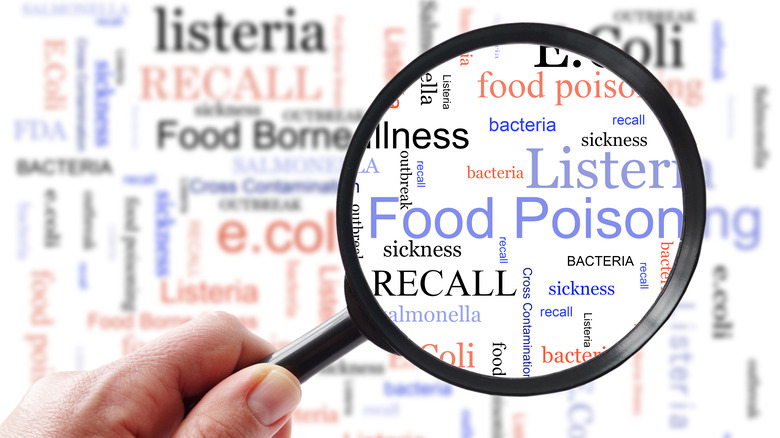What Happens To Your Body When You Eat Deli Meat Every Day
As far as lunchtime staples go, it's hard to get more iconic than deli meat. Cured meats have been a mainstay around the world for hundreds of years (via Vice), and despite the increasing popularity of meat-free diets, the deli meat market shows no signs of getting small any time soon. In October 2021, U.S. citizens spent an enormous $418 million on deli meats, according to Statista, and with dozens of brands on sale in any given store, from salami to bologna, pastrami to turkey, there's a little something for everyone out there (per Eat This, Not That!).
But let's be real: Deli meats aren't exactly synonymous with health. Although certain types of deli meat prioritize delivering lean protein to their customers' diets, such as Applegate Naturals Oven Roasted Turkey Breast (with 11 g of protein per serving and relatively low sodium content), others aren't so great. Deli meat is notorious for its high levels of sodium, fats, and potential additives, and eating it every day may be doing more to your body than you think. So let's do a bit of unwrapping on these products, and see what happens when you eat them every day.
Eating deli meat every day could affect your heart health
A lot of processing goes into the slices of ham, bologna, pastrami, and beef that adorn the deli meat aisles. And unfortunately, the consumption of these processed and red meats daily may have a serious impact on your heart over time. Research published in Critical Reviews in Food Science and Nutrition examined the link between consuming various types of meat daily and the risk of developing coronary heart disease. The authors of the research found that eating processed meat regularly boosted the risk of developing heart disease by 18%, with unprocessed red meat raising the chance of experiencing coronary heart disease by 9%.
For individuals who tend to favor poultry consumption, there was better news: There appeared to be no correlation between eating poultry and increased heart disease risk. This may not be music to the ears of deli meat lovers, however, as even turkey luncheon meat can be heavily processed, potentially nullifying its relative health benefits. One of the best ways to minimize your risk of heart disease associated with eating deli meats regularly is to simply limit your consumption, according to the study's co-lead author Keren Papier, via the University of Oxford. Favoring unprocessed poultry meat sources is also a great way to get your protein in without incurring significant risk.
Regular deli meat consumption could increase your risk of certain cancers
Eating with our futures in mind is always important to do. And if you're eating deli meat every day, it's useful to know that you may be inadvertently putting your body at greater risk of developing certain conditions later down the line. Processed meat has been directly linked to an increased risk of developing bowel cancer, with eating higher amounts of red meat in general also potentially increasing your cancer risk, according to Cancer Research UK. The chance of developing stomach and pancreatic cancer may also be made higher by eating processed meat regularly, although more study needs to be conducted.
The higher risk is down to several ingredients added to deli meats during the processing stage, and some that are already present in the meats themselves, Cancer Research UK says. The existence of haem, a red-colored pigment that occurs in red meats, can prompt chemical reactions throughout the body that make cancer more likely. Also of concern are the nitrates and nitrites added to many types of processed meat. These substances can convert in your body to compounds known as nitrosamines, which have been observed to cause cancer in animal studies, as Live Science discusses. As raising your processed meat intake by just 25 g daily can heighten your cancer risk, it's advisable to try and reduce and moderate how much you chow down on things like pastrami and sausage.
Deli meats can come with a surprising number of additives
It's probably little surprise that when meat is "processed," stuff is added to it. Sort of comes with the territory, right? But what might surprise you is how many additional ingredients you might be consuming when you eat deli meat every day. As well as the large amounts of sodium that can be added to deli meats, you might also find ingredients like modified corn starch, carrageenan (a type of seaweed extract), sodium phosphate, and even turkey broth added to the slices you're stuffing into your sub (per Eat This, Not That!). These additives perform various functions for the meat, such as keeping the slices juicy and plump and boosting their flavor.
It's important to bear in mind that while these additives may make the ingredients list far lengthier than what you might expect from a meat product, they're all safe for consumption. However, certain ingredients like turkey broth may boost the sodium levels of your sandwich through the roof. That's why it's useful to look for deli meats that keep their ingredients list short. Registered dietitian Jenna A. Werner said to Eat This, Not That! that she looks for "brands with simple, minimal ingredients, low sodium and those that are unflavored (meaning no 'smoked,' 'honey,' or 'sauced' styles)."
Eating deli meat daily could raise your blood pressure
Keeping an eye on your blood pressure can't be overstated. Hypertension can increase the risk of deadly conditions like stroke and heart disease, according to the Centers for Disease Control and Prevention (CDC). And with almost half of all U.S. adults having elevated blood pressure, it's a common issue that is only ever beneficial to address. That's why interrogating the contents of your diet to see if you're eating anything that may be raising your blood pressure is so important — and why eating processed deli meat every day may be seriously risky.
Eating processed red meat regularly has been linked to a higher risk of high blood pressure, according to a study published in The American Journal of Clinical Nutrition. Notably, a correlation wasn't found between hypertension and eating red meat that wasn't processed. One of the main reasons why processed red meat (and processed meat in general) is so bad for blood pressure is because of the often-enormous amounts of sodium added to them to help preserve and flavor the food, according to Verywell Health. You can also often unintentionally boost your sodium intake even further by pairing your deli meats with bread (which contains a perhaps surprising amount of salt) or other salty additions, which may impact your blood pressure even further.
Daily deli meats may boost certain nutrient levels in your body
When it comes to nutrients from food, we tend to focus the conversation on fruit and vegetables. Makes sense – after all, they're chock-full of vitamins and minerals. But meats, even processed ones like deli meats, can still give us a powerful nutritional boost in certain areas, and eating deli meat daily could help us stay topped up with key minerals and vitamins. Deli meats can provide a kick of iron and zinc per serving, according to Eating Well. These essential minerals support the body in a range of functions, with zinc serving to bolster immunity and eye health (per National Institutes of Health), and iron aiding in the creation of healthy red blood cells, proper cell function, and growth (per National Institutes of Health).
Deli meat also can deliver a healthy dose of vitamin B12. This vital vitamin, like iron, helps to create red blood cells, as well as DNA, and deficiency can lead to tiredness, vision loss, nerve problems, and mental health conditions, according to WebMD. And, of course, those turkey slices you eat for lunch will boost your protein content through the roof, which serves as the building blocks of your body (per the Harvard T.H. Chan School of Public Health).
Your risk of contracting Listeria may be higher
Deli meats may be delicious, but they can also be a little risky sometimes, as they can carry an increased potential for foodborne illness. "Deli meats might contain Listeria bacteria due to cross-contamination, which can affect pregnant women, older adults, and people with weakened immune systems. Outbreaks of Listeria have been linked to deli meats, hot dogs, and soft cheeses," states registered dietitian and Stirlist owner Amber Pankonin to Eat This, Not That!. The accompanying illness that comes with Listeria, known as listeriosis, can appear anywhere between several days to a month after someone eats infected food, and may result in muscle aches, nausea, and diarrhea, according to the Mayo Clinic.
Listeriosis can generally be treated fairly quickly with antibiotics, and for many people, eating Listeria-infected food doesn't result in any significant illness. But if you're pregnant or immunocompromised, it's far riskier, says Pankonin (via Eat This, Not That!). People in these more vulnerable groups should ideally avoid deli meat "unless heated to a temperature of 165 F before eating," Pankonin advises.
Eating deli meat every day might reduce bone strength
We're always told that drinking milk will make our bones and joints strong and healthy (via Healthline). But what about meat? While you might assume that deli meat is the ideal food for bone strength — thanks to its protein content being ideal for building healthy bone mass, per the International Osteoporosis Foundation – the truth is far more complicated. Eating deli meat regularly may in fact inhibit bone strength and increase the likelihood of developing osteoporosis, according to research from the Cornell-China-Oxford Project on Nutrition, Health, and Environment (discussed via Cornell Chronicle). It's theorized that animal proteins may actually suck calcium out of your bones, reducing bone density. In contrast, folks who eat primarily vegetarian diets benefit from a clearer pathway of nutrients to skeletal health.
With deli meat specifically, there's also sodium to consider. Deli meats are typically sky-high in sodium (via WebMD), and this salt can significantly weaken bone strength over time, according to Action on Salt. Having too much salt in your diet can also lead to hypertension, which may lead to more calcium being pulled out of your bones.
Eating deli meats daily may increase your fat and calorie intake
For many people, there are few things more delicious on this earth than a sub sandwich stacked high with deli meats. But all of those slices may be causing you to ingest more calories and fat than you think, and it may well come down to the type of meat you're going for. "Certain types of deli meat are higher in fat and calories than others," explains registered dietitian Amber Pankonin to Eat This, Not That!. She adds, "Salami and bologna are often the highest in fat. In fact, certain brands of bologna might be as high as 90 calories and 7 grams of fat per slice." When you consider that you might be placing several slices in a sandwich, in addition to other ingredients, that can quickly add up.
It's important, therefore, to make sure you're checking the label of any deli meat you're buying if you're trying to monitor your calorie or fat intake. It's also useful to remember that not all deli meats are created equal: Certain lunch meats, like chicken or turkey breast, may be significantly leaner and lower in fat than their red meat counterparts, as Livestrong shows.
Deli meat every day can cause you to feel bloated
Feeling bloated is one of the most uncomfortable experiences out there, and it can happen when you least expect it. From your hormones to the medication you're taking, to the sheer amount of time you spend on your feet — it can feel like anything can cause you to retain water (per WebMD). And certain foods you eat may also cause you to get that puffy feeling, with deli meats, especially if eaten frequently, being one of the main culprits. Loaded with salt, lunch meats and other forms of processed meat skyrocket your sodium intake, and when you have too much sodium in your system, your body takes it as a signal to hold onto that water for dear life. Cue puffiness, cue discomfort.
Luckily, if you're experiencing bloating, there are several things you can do to ease your symptoms. The first, and potentially most important thing, is to limit your salt intake, states Healthline. Try opting for deli meats that are lower in sodium, or cooking your own meat at home to control salt levels. You can also try and ensure that you're consuming nutrients like potassium and vitamin B6, which help to move fluids through the body.
Eating deli meat daily might increase your risk of developing diabetes
Diabetes development as a result of diet is most frequently associated with the amount of sugar we eat. But the deli meat we eat (yep, we're poets, people!) may also affect our diabetes risk, according to a review published in Circulation. The review included twenty different studies with a range of over a million people assessed, looking for correlations between meat consumption and diabetes mellitus. It was found that the regular consumption of processed meats put people at a 19% higher risk of developing diabetes in their lifetimes.
The study also looked at unprocessed red meats and found that there was no significant increased risk of developing diabetes when eating these. What was particularly notable in the review was that the chance of developing diabetes was higher even when eating as little as 50 grams per day of processed meat. The study authors recommended reducing processed meat intake significantly to try and avoid any potential health impacts like diabetes and heart disease. "Based on our findings, eating one serving per week or less would be associated with relatively small risk," states the lead study author Renata Micha via the Harvard T.H. Chan School of Public Health.
Consuming deli meat may affect your eye health
It can sometimes be easy to forget how much our eyes do on a day-to-day basis, processing visual information second by second to keep us moving through the world. That's why keeping on top of eye health is so important — and our diets have a big part to play. But eating deli meat daily may unfortunately not be the best thing you can do for your eyes, due to the sky-high sodium levels in a lot of lunch meats out there, says WebMD.
The super-high sodium content can, over time, contribute to high blood pressure, which may lead to a host of eye-related conditions. Hypertension can impact the eye's blood vessels heavily, affecting the function of your retina and your optic nerve and causing vision loss, a condition called hypertensive retinopathy (per Healthline). Another condition, choroidopathy, occurs when the underside of the retina is affected by excess fluid buildup, again causing vision problems (per MedlinePlus). Keeping your sodium levels moderate can help you to avoid vision-related conditions.
You may end up dehydrated if you eat deli meat every day
Okay, so we don't expect the food we eat to make us dehydrated. Most of the time, we place the blame for that one on not drinking enough water. And while it's certainly true that an absence of H20 will leave us parched, eating deli meats every day may actually do the same thing. The first reason for this is because of all that protein. Eating high amounts of protein causes your body to make additional uric acid, which is used to break the protein down and move it through the body (per The Healthy). This then causes the kidneys to need more water to help flush everything through — so they draw the required water from around our body, potentially leaving us dehydrated.
But it's not just the protein that can dehydrate us. Cured meats are often salt-heavy, and may contain additional ingredients like sugar to help flavor them and extend their shelf life. Both salt and sugar can cause dehydration when eaten in excessive amounts, as Eat This, Not That! indicates. To avoid this, make sure your lunch meat is additive-free as much as possible.
Eating deli meat daily can give you bad breath
If we had to rank the things we like least in this world, bad breath would probably be up there. But the truth is, bad breath can strike any of us at any time, and sometimes it's due to our diets. Eating deli meat daily won't help much on the halitosis front, due to the correlation between meat consumption and bad breath, as Colgate discusses. This is all thanks to the high-protein nature of cured meats. Unfortunately, said protein attaches itself readily around your mouth and in your dental crevices, prompting bacteria to rush to it. This bacteria will end up causing bad breath, as well as deteriorating your tooth quality over time.
So what's the solution? While reducing your meat intake will certainly help you tackle the odor, simple fixes like drinking adequate amounts of water after a protein-heavy meal can rid your mouth of the bacteria that's making itself at home. It's also useful to carry dental floss with you to use after you've eaten, or potentially a toothbrush and toothpaste to give your mouth a once-over following that turkey sandwich.














